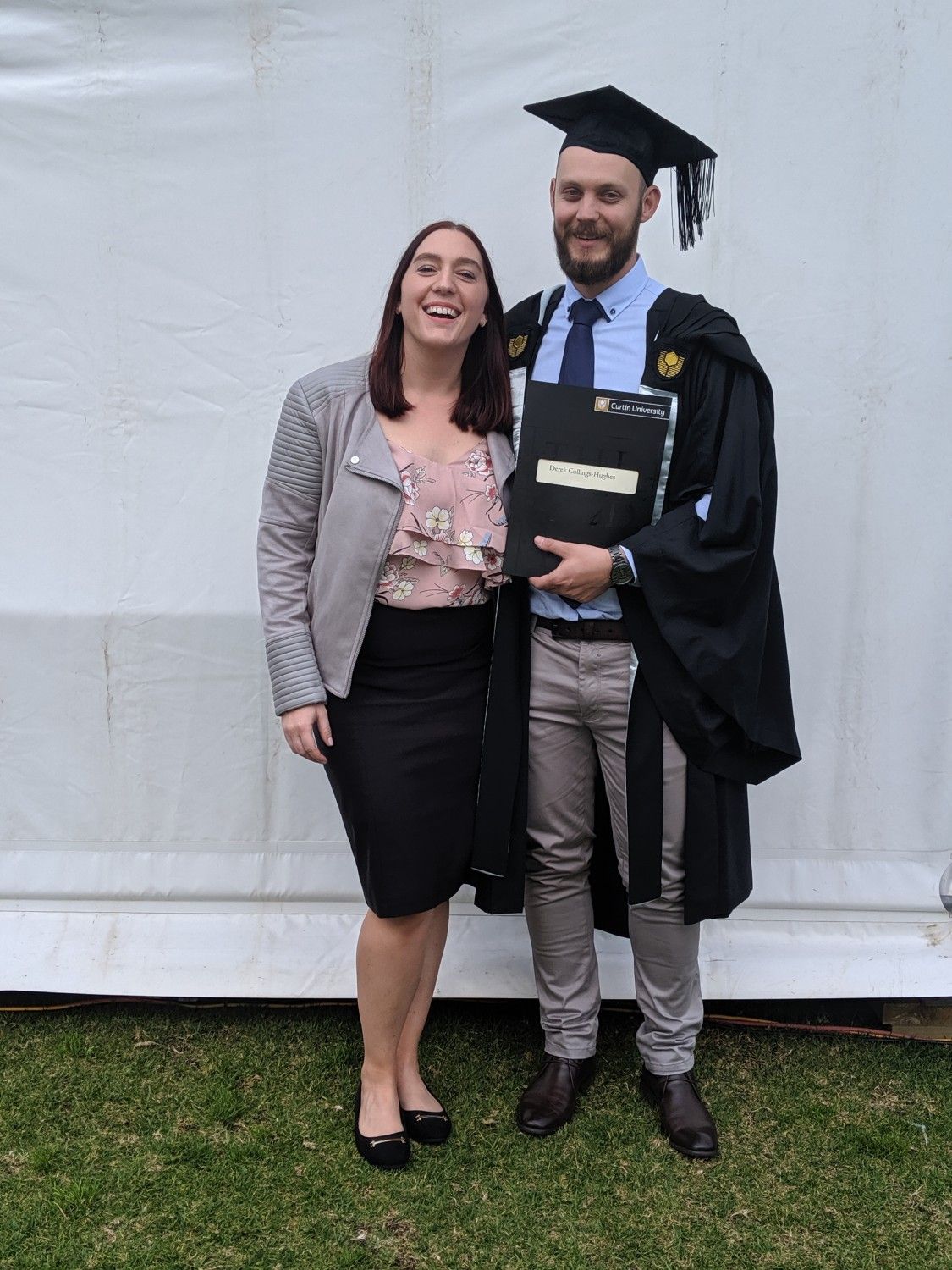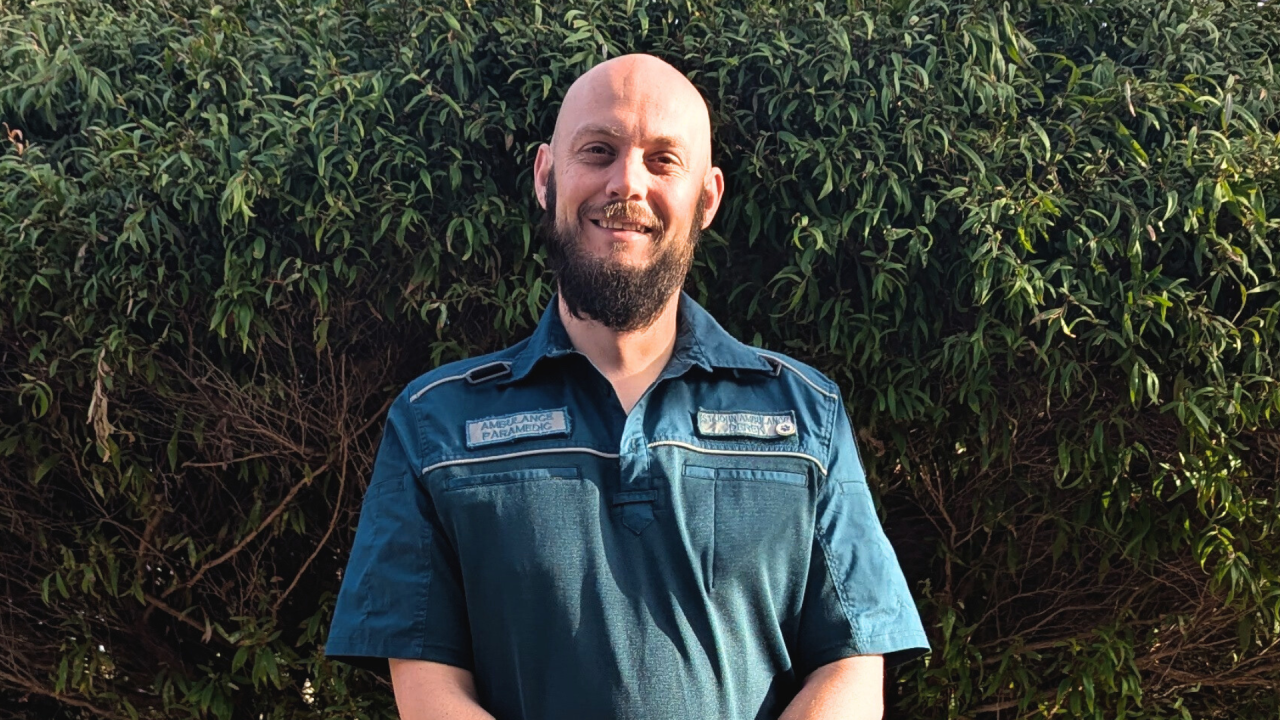Curtin Paramedicine graduate Derek Collings-Hughes always knew in heart that he wanted to help the greater good.
At school, Curtin Paramedicine graduate Derek Collings-Hughes didn’t even know paramedicine existed, let alone that it would become his chosen profession.
But a young Derek always knew in his heart that he wanted to help people and be outside.
It was during a visit to his General Practitioner to collect a medical certificate that planted the seed for his future career in paramedicine.
“I went to my GP for a medical certificate as I had missed an exam. I was doing a science degree at the time, and he suggested I should consider becoming a paramedic.
“After doing a Google search on what a paramedicine career involves, the rest was history,” he said.
Derek shares his fascinating journey and advice on building resilience and bouncing back.
What led you to pursue a career in paramedicine?
My career trajectory has been far from traditional.
Growing up in a low socioeconomic area in regional New Zealand, I was exposed to the big divides between the rich and the poor.
Living in these communities, sometimes just having a job is great, let alone what the job entails.
As a young child, I was surrounded by a lot of unemployment, and often the only employment available was unskilled labour.
I soon discovered that one of the best ways to pull yourself out was by knuckling down and pursuing a career that makes a difference in the lives of others, which in turn can give you greater social capital, enabling you to better advocate for equity and social justice in the community.
Coming from a low socioeconomic background, I was fortunate to get some career breaks that have allowed me to get to where I am today.
One of my first ever jobs was working as a phlebotomist, which involved collecting blood samples for patients for medical testing, diagnosis, and blood donations.
I was also a volunteer paramedic for nine years, which allowed me to eventually pursue higher education and graduate from Curtin as a fully-fledged paramedic.

Although my career path hasn’t been straightforward, through hard work and persistence, I was given opportunities that have allowed me to end up where I am today.
What do you love the most about your job as a Paramedic?
What I love the most is the variety in what every day looks like, which makes it very interesting.
Variety is important to me – I am a researcher, a teacher, and I work clinically, and it’s those different ways of thinking that light me up.
We often say a paramedic is a special type of person, and I think that’s true.
It’s hard to put into words what it is that makes us unique, but I truly believe the difference is in how we solve a problem. It’s not necessarily any better, it’s just different.
It does take a certain type of person to deal with the daily challenges of this career, such as encountering unfolding emergencies and switching between different problems.
I think one of the biggest challenges is being able to switch – often someone’s life will be in the balance, and you need to make quick decisions with very limited information.
Most people will often rise to the occasion, but it’s whether they would want to show up again. If you can keep showing up, then you will stick around in this profession.
Fundamentally, there must be some sort of deep inclination to be able to show up the next day.
What have been some of the biggest challenges you’ve encountered as a Paramedic?
The shift work can be quite isolating. If you’re not mindful, you can quickly discover that all your friends are paramedics. On the flip side, there is a lot of strength in becoming close with your colleagues, as you’re able to have certain conversations that you may not be able to have with someone outside of your work.
It’s also important not to let paramedicine become your identity.
If you think being a Paramedic is all nonstop lights and sirens, that is often not the reality.
As someone who has had an incredibly colourful career, I can tell you that viewing paramedicine in this way is unsustainable.
Sometimes paramedics will complain about the low acuity work, but it’s a real big protective factor if you frame it right, as there are some back-to-back jobs that you simply could not do all day, every day.
Spending one week in an ambulance, you will quickly work out if you can do this all the time.
For those entering the profession, it’s important to understand that although ambulances are essential to our profession, they’re not the only place paramedics work.
Can you share your biggest advice when it comes to building resilience and bouncing back?
My first one is more relevant to paramedicine, but it’s normal to feel stressed at some point.
Sometimes emergency services can have a culture whereby if something affects you or if you get stressed, then maybe you’re not cut out for this, but this is quite outdated.
It’s important to remember that stress is a natural response and not all stress is bad.
Changing your mindset can be difficult, but it can make a massive difference and can help you put things into perspective.
Secondly, it would be looking after yourself holistically.
There is so much evidence showing us the massive benefits of having meaningful, supportive friendships. Sometimes it’s not until you have a really bad day that you realise who your closest friends are.
Also, don’t be afraid to see a mental health professional even when you’re in a good space.
Sometimes people will tend to wait until they are not okay, and then it can become incredibly hard for them to access the right help.
For shift workers, I would also say eat well, drink well, and exercise.
This may sound cliché, but I cannot stress how important this is, as it can be very easy to pick up unhealthy habits.
When I was doing shift work, there were countless times when my meals were from the vending machine or McDonald’s because I hadn’t prepared my meals. So, that makes a big difference.
At the end of the day, it’s just doing those little things each day that enrich your body, mind, and soul.
Derek Collings-Hughes, Registered Paramedic and Academic
Since graduating from Curtin in 2019 with a Bachelor of Science majoring in Paramedicine, Derek now works as an experienced Registered Paramedic and is currently the Paramedicine Discipline Lead at Curtin, where he leads a team and advocates for the advancement of paramedicine through education and research. Derek is dedicated to supporting the next generation of paramedics to realise their full potential and drive progress in the profession through education.



